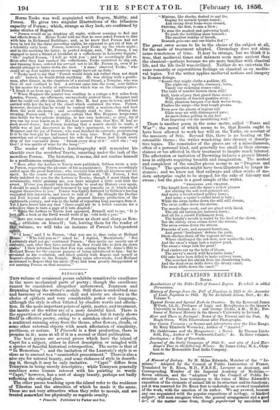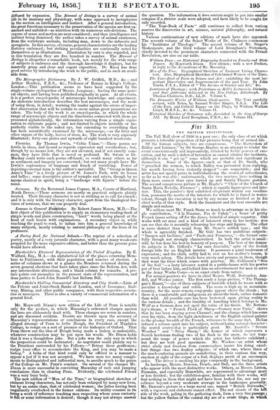PUBLICATIONS RECEIVED.
Boons.
Recollections of the Table-Talk of Samuel Rogers. To which is added Porsoniana.
History of Europe from the Fall of Napoleon in 1815 to the Accession of Louis Napoleon in 1852. By Sir Archibald Alison, Bart., &e. &e. Volume V.
Typical Forms and Special Ends in Creation. By the Reverend James M'Cosh, LL.D., Professor of Logic and Metaphysics in the Queen's University in Ireland, &c. ; and George Dickie, A.M. M.D., Pro- fessor of Natural History in the Queen's University in Ireland.
Here and There in Portugal : Notes of the Present and the Past. By Hugh Owen. With Illustrations after Photographs.
Our Cousin Veronica; or Scenes and Adventures over the Blue Range, By Mary Elizabeth Wormeley, Author of " Amabel."
l'ke Coldstream. and the Musquetters : a Novel. By Thomas Litch- field, Esq., Author of " Warkworth Castle," &c. In three volumes. .Darlington a Tale of Tweedside.
Journal of the Sutlej Campaign of 1815-'6 ; and also of Lord Her- dinge's Tour in thefollowing Winter. By James Coley, M.A., Chap- lain to the Honourable East India Company.
Pinocchi.
A Manual of Zoology. By M. Milne Edwards, Member of the " In- stitute." Adopted by the Council of Public Instruction of France. Translated by R. Knox, M.D., F.R.S.E., Lecturer on Anatomy, and Corresponding Member of the Imperial Academy of Medicine.— Seven editions, and the "adoption" by the Council of Public In- struction of France, bear testimony to the value of Milne Edwards's exposition of the elements of animal life in its structure and its functions; yet it was reserved for Dr. Knox first to undertake an avowed translation of the work, with the sanction of its author. We say avowed, because any one acquainted with the popular expositions of zoology, or kindred snbjectc., will soon recognize where the general arrangement and a good deal of the matter come from, though popularized by anecdotes and diffused by expansion. The Manual of Zoology is a survey of animal life in its anatomy and physiology, with some approach to metaphysics in the section on intelligence and instinct. After a general introduction, the great functions necessary to the preservation of the species are first ex- amined and unfolded—as nutrition with its numerous sub-divisions. The organs of sense and motion are next considered; and then (intelligence and instinct being dismissed) the author takes a survey of animal existences, from the vertebrate animals, including man, down to the infusoria and vongiaria. In this survey, of course, general characteristics are the leading features embraced - but striking peculiarities are continually noted for themselves or as illustrations. Illustration by cuts is also regarded, and in this translation they are five hundred in number. The Manual of Zoology is altogether a remarkable book, not merely for the wide range of subjects it embraces and the thorough knowledge it displays, but for masterly grasp and clear and cogent exposition. Dr. Knox has done good service by introducing the work to the public, and in such an avail- able form.
The Micrographic Dictionary. By J. W. Griffith, M.D. &c. ; and Arthur Henfrey, F.R.S., &c., Professor of Botany in King's College, London.—This publication seems to have been suggested by the single-volume cyclopredias of Messrs. Longman; having the same gene- ral objects, and having been published originally in parts. At all events, it is a perfect encyclopaedia of microscopic knowledge and experiment. An elaborate introduction describes the best microscopes, and the mode of using them, in detail ; warning the reader against the errors of imper- fect observation that will be certain to occur unless great precautions are taken. The body of the work is an encyclopreclia, in which the whole range of microscopic objects and the discoveries connected with them are presented alphabetically, the information varying from a simple expla- nation to elaborate papers • and not limited to objects invisible or im- perfectly visible to the naked eye, but extending to everything that has been scientifically examined by the microscope,—as the liver and other organs of the body, leaves of trees, &c. The work is very copiously illustrated ; forty-one plates and upwards of eight hundred wood-cuts.
Versicles. By Thomas Irwin, " Celtic Union."—These poems are fertile in ideas, and fecund as regards expression and versification; but, though by no means low, they are not elevated, and if not exactly com- mon, they have little that is novel' or profound. Mr. Swain or Dr. Mackay could write such poems off-hand; so could many others as far as sentiment and imagery are concerned ; but not many people have Mr. Irwin's copiousness of language and knack of versifying. Power of depicting external form is the author's specialith. The Group in Queen Anne's Time" is a lively picture of St. James's Park, with its beaux and belles ; some descriptive pieces of nymphs and satyrs, though by no means classical in spirit, bring a "landscape with figures" before the mind.
Sermons. By the Reverend James Copper, M.A., Curate of Hartland, North Devon.—These sermons are mostly on practical subjects plainly treated. Their literary character is not so striking as to call for remark ; and it is only with the literary character, apart from the theological fea- tures of sermons, that we can properly deal.
Lessons in General Ifne;soledge. By Robert James Mason, M.D.—The first object of this publication is to supply an elementary reading-book of simple words and plain construction, "hard" words being placed at the head of each lesson with explanations. A secondary object is, while teaching the pupil to read, to infuse into him a general knowledge of many subjects, mostly relating to natural philosophy or the lives of its professors.
A Poetry Book for National Sehools.—The reprint of a selection of poetry, mostly of a very juvenile character, with a good many wood-cuts prepared for the more expensive edition, and better than the present price would have allowed.
Hardwicke's Electoral Representation of the United Kingdom. By E. Watford, Esq., M.A.—An alphabetical list of the places returning Mem- bers to Parliament, with their population and number of electors. A series of columns shows at a glance the Members returned during the seven general elections that have taken place since the Reform Act, with any intermediate alterations, and a blank column for remarks. A pre- face points out anomalies in the present state of the representation, and does justice to Lord John Russell's last Reform Bill.
Hardwicke's Shilling Commercial Directory and City Guide.—Lists of the Private and Joint-Stock Banks of London, and of Insurance, Rail- way, Mining, and other public companies, with their respective secreta- ries or managers. There is also a variety of commercial information of a general kind.
Mr. Hepworth Dixon's new edition of the Life of Penn is notable only for the preface, in which Macaulay's reiterated charges against the hero are elaborately dealt with. These charges are seven in number, and are discussed seriatim. Doubts are thrown upon the accuracy of Macaulay's representations or conclusions in every case, except the alleged attempt of Penn to bribe Hough, the President' of Magdalen College, to resign on a sort of promise of the bishopric of Oxford. That Penn threw out the idea of Hough being made a bishop is undeniable, whatever construction may be put upon his words. Mr. Dixon holds that it was a thoughtless joke. But a joke was the only way in which the proposition could be insinuated : no negotiator could plainly say to the President surrounded by his Fellows—" Betray these gentlemen; resign your office to accommodate the King, and you may be made a bishop." A bribe of that kind could only be offered in a manner to appear a jest if it was not accepted. We have seen too many compli- ments to distinguished and influential men, to ascribe much to the praise of the College on. Mr. •Penn's conduct. On several of the charges Mr. Dixon is more successful in convicting Macaulay of rash and jumping conclusions than in clearing Penn. Evidently, the celebrated Friend was a very busy body. The new edition of " Men of the Time," or biographical sketches .of eminent living characters, has not only been enlarged by many new lives, but byentire class, that of celebrated women; the ladies having been ungallantly overlooked in the former editions. Its utility consists in its being a work of reference touching men respecting whom some curiosity is felt or some information is desired; though it may not always answer
the question. The information it does contain might be put into small& compass if a stricter scale were adopted, and facts likely to be sought for only recorded. "The Year-Book of Facts " still continues to collect from various sources the discoveries in art, science, natural philosophy, and natural history.
Various continuations of new editions of mark have also appeared. The seventh volume of the Select Works of Dr. Chalmers commences his " Institutes of Theology." The second volume of Mr. Singer's Shakespeare, and the third volume of Lord Brougham's Statesmen, chiefly devoted to the prominent characters connected with the French Revolution, are also on our table.
William Penn ; an Historical Biography founded on Family and State Papers. By Hepworth Dixon. /sew edition; with a new Preface, in reply to the Accusations of Mr. Macaulay.
Men of the Time. Biographical Sketches of Eminent Living Charac- ters. Also, Biographical Sketches of Celebrated Women of the Time. The Year-Book of Facts in Science and Art • exhibitinq the most im- portant Discoveries and Improvements of the past I ear. By Jahn F.S.A., Editor of " The Areana of Science and Art," &c. Institutes of Theology; with Prelections on Hill's Lectures in Diviniije, and four Addressee delivered in the New College, Edinburgh. By Thomas Chalmers, D.D., LL.D. Volume I.
The _Dramatic Works of William Shakespeare. The Text carefully revised, with Notes, by Samuel Weller Singer, F.S.A. The Life of the Poet, and Critical Essays on the Plays, by William Watkiss Lloyd, M.R.S.L., &c. &c. Volume II.
Historical Sketches of Statesmen who flourished in the time of George III. By Henry Lord Brougham, F.R.S., &c. Volume M.



























 Previous page
Previous page